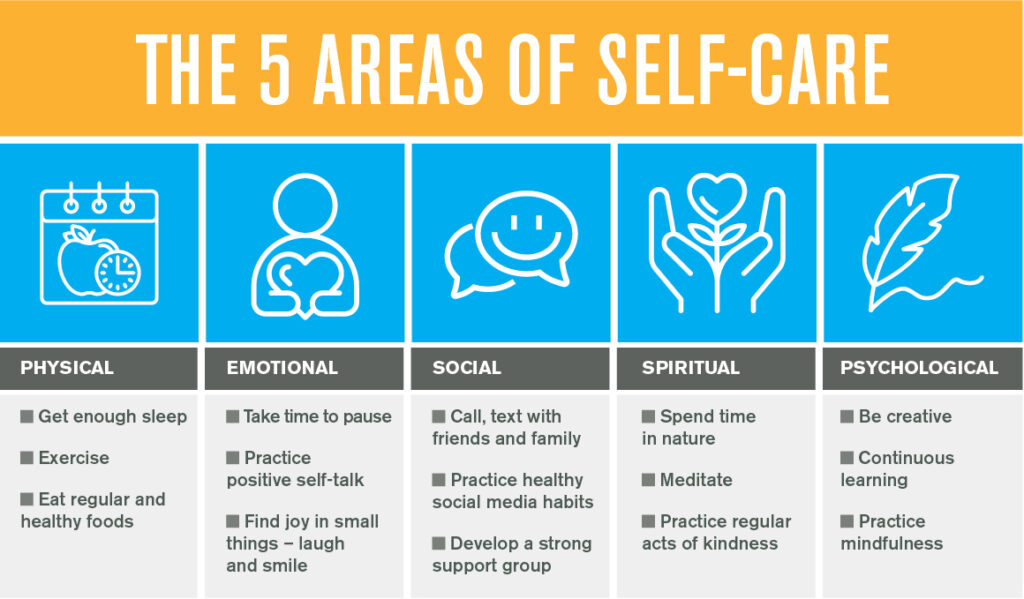In today’s fast-paced world, self-care often takes a back seat to daily responsibilities, work deadlines, and social obligations. But caring for your well-being is essential, not just for survival, but for thriving in life. Self-care is all about making time for practices that help you recharge mentally, emotionally, and physically. Let’s break it down into manageable sections so you can easily incorporate these into your routine.

What is Self-Care?
Self-care isn’t just bubble baths and spa days (though those are great!). It’s about engaging in practices that nurture your mind, body, and spirit. Self-care helps you manage stress, enhance your mood, and maintain balance in life. The key is to find what works for you.

1. Mental Self-Care
Your mental health is the foundation for everything. A healthy mind helps you process emotions, tackle challenges, and stay positive. Here’s how you can nurture it:
a. Practice Mindfulness
Mindfulness is the act of being present in the moment. You can practice it anywhere—whether you’re eating, walking, or simply sitting in silence. It helps you disconnect from the noise of life and refocus on the here and now.
How to Start Mindfulness:
- Spend 5-10 minutes every day focusing on your breath.
- Observe your surroundings and your thoughts without judgment.
- Use apps like Headspace or Calm for guided meditation.
b. Limit Your Screen Time
In today’s digital age, constant notifications and social media can take a toll on your mental health. Endless scrolling leads to information overload, and let’s be honest, the comparison trap can make us feel less than enough.
Action Plan:
- Set screen time limits on your phone.
- Take regular breaks from social media.
- Disconnect from gadgets an hour before bed to improve sleep quality.
c. Learn Something New
Stimulate your brain by picking up a new hobby or skill. Whether it’s learning to cook, play an instrument, or taking up a new language, engaging in something novel keeps your brain sharp.
Ideas to Get Started:
- Sign up for an online course.
- Try a DIY project or a puzzle.
- Dedicate just 15 minutes daily to learning.

2. Emotional Self-Care
Emotional well-being involves understanding, processing, and expressing your emotions in a healthy way. It’s about giving yourself permission to feel and deal with emotions without judgment.
a. Journaling
Writing down your thoughts is an excellent way to process emotions. Journaling provides a safe space to express how you’re feeling and reflect on your experiences.
How to Start Journaling:
- Dedicate a few minutes daily to write freely.
- Use prompts if you’re stuck (e.g., “What am I grateful for today?”).
- Don’t worry about grammar—this is for your eyes only!
b. Set Boundaries
Setting boundaries is one of the most empowering forms of emotional self-care. Saying “no” when necessary protects your energy and prevents burnout.
Boundary-Setting Tips:
- Be clear and assertive about your needs.
- Remember, saying no to others is saying yes to yourself.
- Prioritize activities and people that uplift you.
c. Talk to Someone
You don’t always have to carry your emotional baggage alone. Sometimes, talking to a friend or family member can offer new perspectives and provide relief.
Options for Emotional Support:
- Call or meet a trusted friend.
- Consider therapy if you need professional support.
- Join online or local support groups for specific concerns (e.g., anxiety, grief).

3. Physical Self-Care
Your body is the vessel that carries you through life, so treating it well is crucial. Physical self-care includes activities that nourish, strengthen, and rest your body.
a. Move Your Body
Exercise is not just about staying in shape. It releases endorphins, the “feel-good” chemicals that boost your mood. It’s important to find a type of movement you enjoy so it doesn’t feel like a chore.
Fun Ways to Exercise:
- Try yoga or Pilates for a mindful workout.
- Go for a walk or hike in nature.
- Dance to your favorite music at home.
- Join a sports team or group fitness class for social interaction.
b. Nourish with Food
What you put in your body affects how you feel. Eating nutritious meals boosts energy, improves concentration, and supports emotional stability.
Tips for Healthy Eating:
- Prioritize whole foods: vegetables, fruits, whole grains, and lean proteins.
- Drink enough water to stay hydrated.
- Don’t skip meals, and make sure to eat balanced portions.
c. Prioritize Sleep
Quality sleep is non-negotiable for physical and mental well-being. Lack of sleep leads to irritability, lowered immunity, and decreased productivity. Your body and mind need rest to recover.
Better Sleep Routine:
- Create a bedtime ritual (e.g., reading, taking a warm bath).
- Set a consistent sleep schedule.
- Avoid caffeine and heavy meals before bedtime.

4. Social Self-Care
Human beings are wired for connection. Having supportive relationships plays a huge role in your overall happiness and mental health. But not all social interactions are equal—quality is better than quantity.
a. Spend Time with Loved Ones
Surrounding yourself with people who uplift and support you is essential. Whether it’s friends, family, or a partner, nurturing these connections enriches your life.
Tips for Nurturing Relationships:
- Make time for regular catch-ups, even if it’s just a call.
- Engage in activities you both enjoy.
- Be a good listener and show empathy when someone shares their struggles.
b. Schedule “Me Time”
While socializing is important, so is spending time with yourself. Taking time to recharge alone helps you reflect, unwind, and enjoy your own company.
How to Enjoy Your Own Company:
- Set aside an hour each week just for yourself.
- Do something you love without distractions (reading, painting, gardening).
- Practice self-compassion by treating yourself to little pleasures, like a favorite snack or a new book.

5. Spiritual Self-Care
Spiritual self-care doesn’t have to be religious (though it can be). It’s about connecting to something greater than yourself, finding meaning, and cultivating inner peace.
a. Practice Gratitude
Gratitude shifts your focus from what you lack to what you have. It’s a powerful way to foster positivity and appreciate life’s little moments.
Simple Gratitude Practices:
- Keep a gratitude journal: list three things you’re thankful for every day.
- Say thank you to the people around you for small and big things.
- Practice mindfulness to appreciate the present moment.

b. Connect with Nature
Being in nature offers a sense of calm and perspective. Whether it’s a walk in the park or a weekend in the mountains, nature has a way of grounding you.
Easy Ways to Reconnect with Nature:
- Spend 10 minutes outdoors daily, even if it’s just in your backyard.
- Practice grounding by walking barefoot on grass.
- Take nature photos or meditate in a natural setting.
Final Thoughts
Self-care is not selfish; it’s essential. Think of it like recharging your batteries. When you take care of your mental, emotional, and physical well-being, you can show up as the best version of yourself in all areas of life. Remember, you don’t need to overhaul your routine overnight. Start small—maybe a five-minute meditation in the morning or a short walk after work—and build from there. Self-care is a journey, not a destination, so take it one step at a time!







